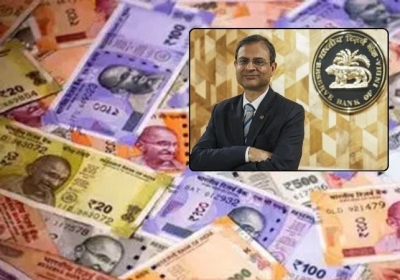8th Pay Commission: 30-34% salary hike likely for government employees, says report


8th Pay Commission: 30-34% salary hike likely for government employees, says report
Digital Desk: Many government employees are eagerly anticipating the implementation of the 8th Pay Commission. According to a recent study by brokerage firm Ambit Capital, the 8th Pay Commission is expected to considerably increase government salaries and pensions by 30-34 percent, affecting around 11 million people.
The recommendations of the 8th Pay Commission are set to take effect in January 2026, but they will not be implemented until the report is written, given to the government, and its recommendations are approved.
Following the release of the 8th Pay Commission in January of this year, there has been a lot of conjecture about how it will affect central government employees' incomes and pensions.
According to a study report by brokerage firm Ambit Capital, implementing the 8th Pay Commission might result in a 30-34% increase in salaries and pensions.
"The 7th Pay Commission (January 2016 - December 2025) implemented a modest compensation raise of approximately 14% (lowest since 1970). According to the report, the 8th Pay Commission is expected to announce a 30-34 percent increase in salaries and pensions for around 11 million beneficiaries, which will enhance consumption.
The Eighth Central Pay Commission (CPC) was announced earlier this year. However, the terms of reference, members, and chairman have not yet been announced. The 8th Salary Commission will affect government employees' base salary, allowances, pensions, and retirement benefits.
The research predicts that the 8th Pay Commission's fitment factor might range from 1.83 to 2.46. Depending on the pay growth recorded across multiple Pay Commissions, the government could be looking at fitment factors ranging from 1.83 to 2.46.
The 8th Pay proposals will most likely influence pensions, which are similar to government salaries in that they contain salaries and dearness allowance but exclude HRA and travel allowance components. The fitment factor will be added to the basic pay component, and the dearness allowance will be reset to zero.
Effective April 2025, the government converted the current National Pension Scheme (NPS) into the Unified Pension Scheme (UPS), which offers a combination of defined contribution and defined benefit plans, with 50% of the final drawn income guaranteed beginning in FY26.
According to senior officials, internal discussions are ongoing, but due to the slow pace of bureaucratic processes, the deployment may take much longer than the expected January 1, 2026, timeframe. Even if the Commission is established before the end of the year, recent period of time indicate that the process from announcement to implementation typically lasts 18-24 months. At this rate, the wage increase is unlikely to come before late 2026 or early 2027.





